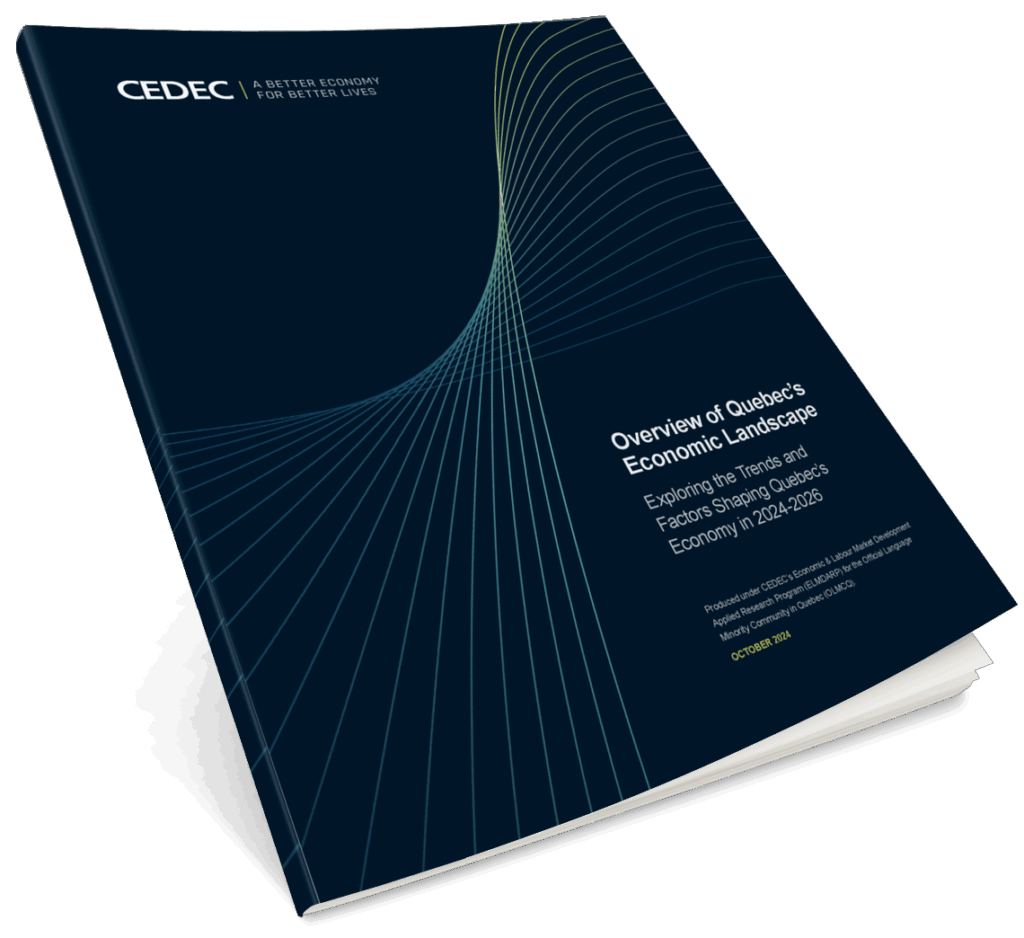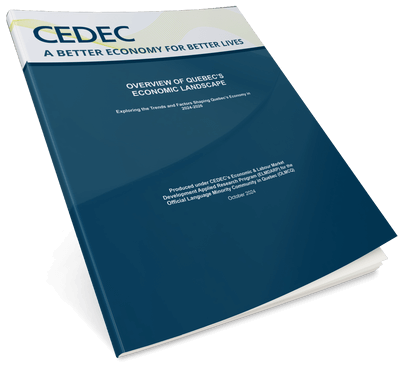Overview of Quebec’s Economic Landscape
Overview of Quebec's Economic Landscape
Executive Summary
The Quebec economy finds itself at a crossroads influenced by a web of global, national, and provincial dynamics. In the aftermath of the unprecedented disruptions caused by the COVID-19 pandemic and amid ongoing geopolitical uncertainties, post-COVID optimism has been tempered by the lingering fiscal pressures and tight financial conditions.
Within the broader Canadian context, the economic narrative presents a number of challenges and opportunities. Canada, like its global counterparts, is navigating the waves of recovery, but a closer inspection reveals fiscal pressures stemming from the extensive support measures implemented during the pandemic. As the nation grapples with these fiscal challenges and the impact of monetary tightening, the report sheds light on the implications for Quebec, considering both the province’s comparable and unique economic characteristics and its role within the larger Canadian economic framework.
Zooming in on Quebec, a distinctive set of economic factors shapes the provincial landscape. While the province mirrors national trends of economic activity and fiscal pressures, the report highlights Quebec’s specific challenges arising from an aging population and tight labour market. As demand for skilled workers intensifies, the province faces the imperative to adapt its workforce and education systems to meet evolving needs. In addition, the report explores how Quebec is positioned within the broader narrative of Canada’s struggle to address the impacts of an aging population on labour supply, emphasizing the necessity for innovative solutions such as digital transformation to mitigate potential economic repercussions.
In the face of these multifaceted challenges, the report sets the stage for a deeper exploration of three pivotal trends that are shaping the Quebec economy. These trends not only define the province’s economic trajectory but also present strategic opportunities for stakeholders to foster sustainable growth and resilience in the years ahead.
Digitization Across Sectors
The Quebec economy is rapidly adapting to the digital era, with transformative impacts resonating across manufacturing, agriculture, health care, education, and tourism. This trend not only enhances efficiency but also fosters innovation, positioning Quebec as a competitive force on the global stage.
Demographic Changes and Solutions
A significant trend shaping Quebec’s economic landscape is the demographic shift, particularly the aging population. As the province grapples with the consequences of an older workforce, the report emphasizes the critical role of strategic solutions. Immigration emerges as a key driver, bringing fresh skills and perspectives, while repurposing educational and skill development offerings and career development initiatives are vital for adapting the workforce to evolving demands.
Green Energy Investments
Quebec is witnessing a shift towards sustainable practices to meet its energy targets, with considerable investments in green energy initiatives. This trend spans various sectors, including manufacturing (electric vehicles), aerospace, transportation, agriculture and housing.
This report offers strategic insights and illustrations of collaborative economic development opportunities for stakeholders navigating the evolving Quebec economy. It underscores the importance of embracing digitalization, leveraging demographic shifts, and capitalizing on green investments. By understanding and harnessing these trends, public private and civil society collaboration, innovation and a forward-looking vision, the province can chart a course towards sustainable economic development that benefits future generations.
As it navigates these trends, initiatives, investments and programs, this document provides a starting point from which to recognize and understand the potential opportunities and challenges faced by English-speaking communities in the province. However, it is crucial to acknowledge that the complexities of this landscape require a more detailed and nuanced examination.
As such, future research will look at delving into conducting more targeted and granular analyses to identify specific opportunities, address unique needs, and formulate strategic recommendations that empower English-speaking communities to actively participate and thrive in Quebec’s evolving economic landscape.
Through ongoing research efforts, CEDEC endeavors to translate such opportunities into Ventures that ensure the economic well-being of all linguistic and cultural communities within the province.
BASIC ECONOMIC DEVELOPMENT IDEAS AND FRAMEWORKS
- A better economy for better lives
- What is an economy and why is it important?
- Cultivating collaboration as the future engine of ESCQ economic development
- Providing a strategic framework and nurturing strategic alignment
THE 2024-2026 OVERVIEW OF QUEBEC’S ECONOMIC LANDSCAPE
- CEDEC’s official language program of applied economic analyses, information, and advice
- What you will find in the 2024-2026 overview of Quebec’s economic landscape
GENERAL FEATURES OF THE GLOBAL, CANADIAN, AND QUEBEC ECONOMIES BETWEEN 2024 AND 2026
- From a global perspective
- From a Canadian perspective
- From a Quebec perspective
WHAT DO THESE TRENDS AND FACTORS MEAN FOR ECONOMIC DEVELOPMENT?
THE THREE KEY FORCES SHAPING OUR ECONOMY
DIGITAL AND ARTIFICIAL INTELLIGENCE (AI) TRANSFORMATION
- Quebec is investing heavily in AI
- Digital transformation of key industries in Quebec
SHIFTING DEMOGRAPHICS AND THE QUEBEC LABOUR MARKET
- Demographic and labour market shifts and different segments of the Quebec economy
- Seniors and mature workers: potential contributors to addressing labour shortages
- Youth unemployment on the rise: lasting impacts on career development and income and employment prospects could ensue
- Immigration – contributing to solving labour market challenges; underutilization of skills is a problem
- Micro credentials, career development and foreign credential recognition are also crucial to address labour shortages and productivity challenges
TRANSITIONING TO A GREENER, MORE SUSTAINABLE ECONOMY
- What is Quebec’s green economy playbook? From electrifying the economy to tackling climate change
- Quebec’s English speakers and some implications of emerging trends
POTENTIAL AVENUES FOR ESCQ COLLABORATIVE ECONOMIC DEVELOPMENT


